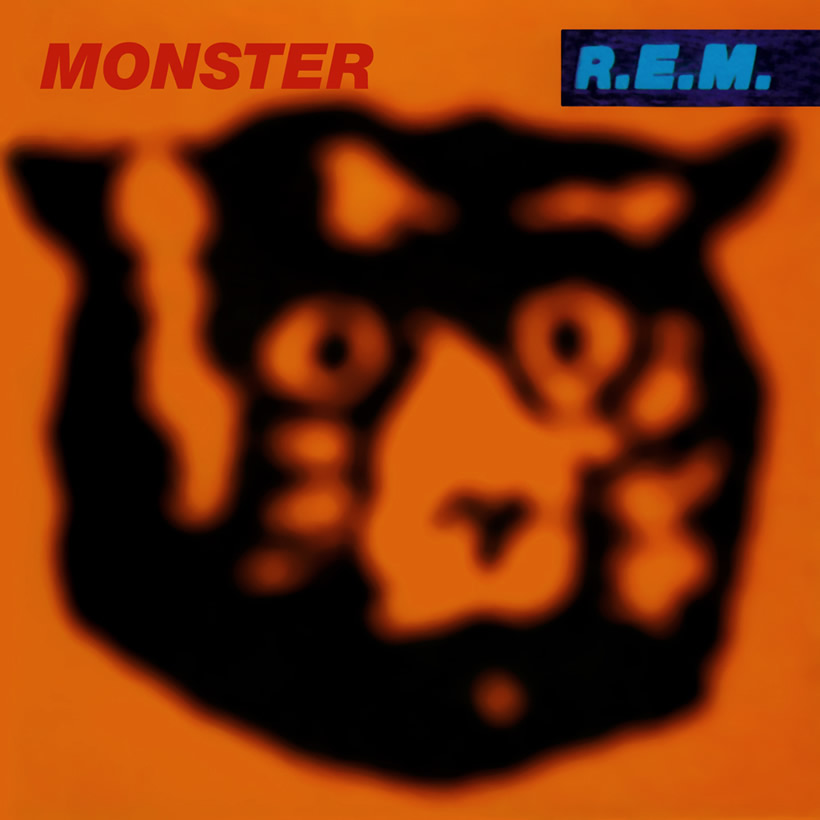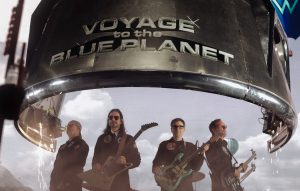During the first decade of their career, R.E.M. had become accustomed to fighting an uphill battle. Their timeless yet enigmatic early albums Murmur, Reckoning, and Fables Of The Reconstruction had engrossed their hardcore fanbase, but it took the cumulative effect of that urgent, muscular triumvirate of Lifes Rich Pageant, Document, and Green to finally push them to the brink of mainstream acceptance. When their ninth studio album, Monster, saw the light of day, it served notice that R.E.M. has truly entered the big leagues.
Up to this stage of their career, the versatile quartet had been perceived as the integrity-fueled, alt-rock heroes it was OK to like. Yet, with the multi-million-selling double-whammy of 1991’s Out Of Time and the following year’s Automatic For The People, the band made an enviably seamless transition into bona fide global superstars.
Lesser bands could well have crumbled and given into excess-fueled madness at this juncture, yet R.E.M.’s well-established work ethic instead kicked in and ensured they remained focused. With their post-Automatic For The People promotional duties completed, the four band members hunkered down for a four-day meeting in the Mexican resort town of Acapulco, discussing where they would go next.
Wonderful records though they were, Out Of Time and Automatic… had both consisted primarily of introspective, acoustic-based numbers; during their Mexican sojourn, the four bandmates reached a consensus. For their next album, R.E.M. would get back to making what guitarist Peter Buck had previously described to the NME as a “real noisy” rock’n’roll record which the band pledged to tour for the first time since undertaking a year-long trek in support of 1988’s Green.
“Playing loud electric guitar music is as fun as music can be”
Later in 1993, pre-production work began at Kingsway Studios in New Orleans, where the band worked up a bunch of new songs before moving to Crossover Soundstage, in Atlanta, Georgia, in February 1994. There they laid down most of the basic tracks for what would become their ninth LP, Monster. Though they had built their reputation as a consummate live act, R.E.M. had been off the road for the best part of five years, and co-producer Scott Litt wisely thought the band would benefit from recording their new songs live, partly to re-familiarize them with the rigors of performing in concert. “I thought they hadn’t toured for a while, so it would be good for them to get into that mindset,” Litt later informed Rolling Stone. “You know… monitors, PA, standing up.”
Unlike the band’s two previous records, the Monster sessions proved atypically fraught. Both Bill Berry and Mike Mills were struck down with illness; Michael Stipe suffered a tooth abscess that required urgent medical attention after the sessions had moved on to Criteria Studios in Miami; the band was collectively knocked sideways by the recent deaths of Stipe’s personal friends, actor River Phoenix and Nirvana frontman Kurt Cobain. The latter event hit Stipe especially hard and inspired Monster’s most intense track, the eerie, funereal tribute “Let Me In.”
“That song is me on the phone to Kurt, trying to get him out of the frame of mind he was in,” Stipe later told UK rock monthly Select. “I wanted him to know that… he was going to make it through. He and I were going to make a trial run of [Nirvana’s] next album. It was set up. He had a plane ticket. At the last minute, he called and said, ‘I can’t come.’”
With the mixing sessions finally wrapping in LA during the summer of 1994, Monster was scheduled for release in October, and the band gave some preliminary interviews to provide the public with an insight into the new record. In a Time magazine feature, Mike Mills stressed that it would be anything but another Automatic For The People. “On past albums we had been exploring acoustic instruments, trying to use the piano and mandolin,” he said, before adding, “And you come back to the fact that playing loud electric guitar music is as fun as music can be.”
Monster was trailed by one of its strongest tracks, the grungey, anthemic “What’s The Frequency, Kenneth?” Stipe copped the title from a 1986 incident in New York, relating to a vicious attack on CBS Evening News presenter Dan Rather by two unknown assailants who reputedly repeated the phrase, “Kenneth, what’s the frequency?” while beating him. Promoted by a striking video directed by ex-Cabaret Voltaire filmmaker Peter Care, wherein Stipe paraded his newly shaven head, “… Kenneth” peaked at No.21 on the Billboard Hot 100 and at No.9 in the UK Top 40, and went on to become one of the band’s most popular – and most regularly performed – live numbers.
Evolve or die
Released on September 27, 1994, Monster was, as Mills had previously hinted, very much a product of electric rock’n’roll instruments. Recorded with only minimal overdubs and long on heavily distorted guitars, it was chock-full of brash, extroverted garage-rockers such as “I Took Your Name,” “Star 69” and the louche, T.Rex-ian “Crush With Eyeliner.” while, in most cases, Michael Stipe’s lyrics (which were written almost entirely in character) dealt with the nature of celebrity: something which R.E.M. were now having to deal with at very close quarters.
Monster was released at a time when musical trends were changing all over the world. Britpop was on the rise in the UK, while, in the US, alt-rock acts as diverse as Smashing Pumpkins and Green Day was staking their claims with multi-platinum LPs. Yet Monster comfortably held its own and critics received it with enthusiasm. While acknowledging the album’s urgency and big rock shapes, Rolling Stone’s four-and-a-half-star review, penned by Robert Palmer, shrewdly concluded that the album was “a deeply felt, thematically coherent, consistently invigorating challenge to ‘evolve or die’, with all the courage of its convictions”.
A decade after its release, only “What’s The Frequency, Kenneth?” was picked for the much-lauded anthology collection In Time: The Best Of R.E.M. 1988-2003, suggesting that the band’s feelings towards the album have cooled over the years. Yet while songs such as the dance-enhanced “King Of Comedy” might now seem dated to some ears, Monster includes several of the band’s most underrated gems. Though perhaps at odds with most of the album’s high-octane guitar pop, both the tender “Strange Currencies” and the shimmering, soul-infused “Tongue” (delivered by Stipe in an atypical, yet highly affecting falsetto) are worth the price of admission alone and certainly remain comparable with the best of the group’s illustrious canon.
Though it failed replicate the stratospheric successes of Out Of Time and Automatic For The People, Monster proved to be another mega-selling album. Debuting at No.1 on the prestigious US Billboard 200, it eventually moved over four million copies in North America and received additional multi-platinum certifications from a variety of countries, including Canada and the UK, where Monster also bagged the No.1 spot during its week of release.
As good as their word, R.E.M. undertook a massive world tour in support of the album, yet difficulties that beset the band during the recording sessions returned to blight the tour. Bolstered by support acts including Grant Lee Buffalo and Died Pretty, the Australasian and Far East dates went off without a hitch, but when the tour swung through Europe and reached Lausanne, Switzerland, on March 1, 1995, Bill Berry complained of severe headaches while onstage and was later diagnosed with a ruptured brain aneurysm.
Remarkably, after surgery and the cancellation of a raft of dates, Berry rejoined the tour in the US in May, though after R.E.M. returned to Europe, disaster struck again, with Mike Mills requiring urgent abdominal surgery. Once again, the tour restarted successfully, only for Michael Stipe to undergo a hernia operation which – incredibly – was performed successfully without the need to cancel any further dates.
Again snatching victory from the jaws of adversity, R.E.M. finally sailed through the R.E.M. ’95 Tour’s remaining itinerary, playing a whopping 52 US dates. Three emotional, sold-out shows at The Omni in Atlanta brought the tour to a close, and provided the highlights for the electrifying Peter Care-directed video Road Movie.




